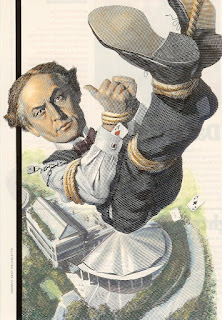The list of the men who have played Houdini on screen is impressive: Tony Curtis, Paul Michael Glaser, Harvey Keitel, Guy Pearce... But even more impressive is the list of actors who at one time or another have been considered for the role of the master magician, but ultimately never saw the inside of the straitjacket. Here is a list of actors who almost played Houdini.
 |
| Paul Muni |
Paul Muni - Best known for the Howard Hughes hit
Scarface
, Paul Muni was considered for the lead in the 1932 RKO biopic,
Now You See It, based on a story treatment by Houdini's friend and ghost-busting colleague, Fulton Oursler. Because the studio had acquired no life-rights, the script would call the main character Harry Pinetti, but it was clearly the story of Houdini, and even included a sequence in which Pinetti/Houdini gets trapped under the ice during a bridge jump (later used in Paramount's 1953
HOUDINI).
Now You See It went through several drafts, including one that suggested "a musical treatment" before being shelved indefinitely in 1936.
UPDATE: Actor
Adolphe Menjou was signed to play Pinetti/Houdini when the movie came close to production in late 1932.
 |
| John Calvert |
John Calvert - Magician and actor John Calvert knew Bess Houdini and Edward Saint when they lived in Hollywood in the 1930s. When Bess saw Calvert's show, she is reported to have said, "Calvert plays the part of a magician better than any actor I have ever seen, except for Harry, of course." Bess would send a letter to Calvert, who had a seven year contract with Columbia, saying, "In my opinion, you are the only actor capable of portraying the life of my late husband, Harry Houdini. Are you interested?"
Calvert was interested. Unfortunately, the head of Columbia, Harry Cohn, was not, complaining that Houdini's story was "lacking in romance and needed a better ending than a punch in the solar plexus."
 |
| Chester Morris |
Chester Morris - After years of effort, Bess Houdini and Edward Saint finally set-up a Houdini biopic at Paramount in 1936. The film would be based on
Houdini His Life Story by Harold Kellock
. Bessie is said to have insisted on a stipulation in the contract that no secrets would be revealed in the film. But who would star as Houdini?
Not long after the sale, Arnold Furstenberg in
The Linking Ring announced an "Exclusive Scoop" that Chester Morris was being considered for the lead role in
The Great Houdini (later called
Houdini The Great). Apart from being an actor, Morris was an amateur magician and a member of the IBM. "He is by far the most logical man for the role," said Furstenberg.
Houdini The Great would languish in development for many years with drafts written by Frank O' Conner and Pierre Collins. Despite Chester's lobbying for the role ("He spent time and money" reported George Boston in
Genii), the studio never gave the project the green light.
 |
| Cary Grant |
Cary Grant, Joseph Cotton, Garry Moore - In 1944 producer David O. Selznick (
Gone With The Wind) pitched the idea of a Houdini biopic to Alfred Hitchcock "with either Cary Grant or
Joe Cotton" in the lead role. Said Selznick, "I think [it] can be an outstanding and enormously popular picture with very great opportunity for treatment by you."
Hitchcock turned down
Houdini, and Selznick eventually cast radio personality and future television star
Garry Moore as his Handcuff King. But like so many other proposed Houdini biopics, Selznick's
Houdini failed to materialize.
 |
| Lee Cobb |
John Garfield or Lee Cobb - In 1950, a former drug store operator, Joseph Raboff, and a real estate man, Earl Cohen, acquired the film, radio, and TV rights to Kellock's
Houdini His Life Story. Teaming with a former Paramount executive, Endre Bohem, the indie producers announced production of
The Life Story of Harry Houdini with "either
John Garfield or Lee Cobb" in the lead role. There was also talk of a half-hour TV series following the film's release.
It's unclear what happened to Film Producers, Inc. ambitious project, but it's likely Raboff and Cohen found they had bitten off more than they could chew and used Endre Bohem's connections to sell their valuable Houdini life rights to Paramount.
 |
| Orson Welles |
Orson Welles - When Paramount announced renewed plans to make a Houdini biopic in 1951, names such as
Edward G. Robinson and
Glenn Ford were mentioned. But influential gossip columnist Hedda Hopper lobbied in print for Orson Welles to play the lead.
Did the studio ever seriously consider Welles? This isn't known, but I agree with Hopper that Welles would have been an inspired choice, and it's somewhat amazing the actor, who was a magician and had seen Houdini in his youth, never played Houdini on stage or screen. However, Paramount did pretty well when they ultimately cast Tony Curtis in the part.
Welles would later collaborate with Another Burgess on a Houdini stage musical, but it's not clear if he had plans to star in the show himself.
 |
| James Caan |
James Caan - In 1974 producer Ray Stark, fresh off his success with
Funny Girl (a musical biopic of Vaudeville star Fanny Brice), announced plans to make
The Magic Man: The Story of Houdini based on William Lindsay Gresham's,
Houdini: the Man Who Walked Through Walls. Stark teamed with producer John Houseman (who would also appear in the film a Sir Arthur Conan Doyle) and hired James Bridges to write and direct.
Variety announced that James Caan, who had rocketed to fame in
The Godfather, was the top choice to play Houdini.
On the strength of the talent involved, Columbia Pictures agreed to distribute the film, which promised to be in production within a year (it was in a race with yet another Paramount Houdini project). Unfortunately, Stark's Houdini movie would never emerge from development hell.
 |
| Robert Blake |
Robert Blake or Charles Bronson - In 1976 NBC developed a Houdini TV movie that would air on the 50th Anniversary of Houdini's death on Halloween. The project was called,
The Heart Is Quicker Than The Eye, and would be produced by Playboy productions from a script by Jean Holloway. The network was actually in a race with rival ABC, who had similar plans to air their own Houdini TV movie written by Melville Shavelson.
Patrick Culliton, who worked as a technical advisor on the project, says two names producer Bill McCutchen mentioned to him to play Houdini were Robert Blake and
Charles Bronson. Bronson was a big movie star at the time so that was probably wishful thinking, but Robert Blake was a real possibility and pretty good choice. Blake was the star of the hit TV show
Baretta at the time.
The Heart Is Quicker The Eye never made it beyond the script stage and NBC lost it's race with ABC, which aired
The Great Houdinis in October of 1976 with another TV star in the lead, Paul Michael Glaser.
 |
| John Belushi |
John Belushi - In 1980 it was reported that comedy star John Belushi was the favorite to play Houdini in the big screen adaptation of E.L. Doctorow's bestselling novel,
Ragtime. It's not known how close Belushi came to getting the part in the Milos Forman directed film (he was starting to branch out into dramatic roles at that point), but Belushi did bare a resemblance to Houdini and his intensity could have been interesting. However, Houdini's role in the movie would be greatly reduced from what it was in the novel, and when the film was released in 1981, Houdini was played by Jeffrey DeMunn in just a few cameo appearances.
 |
| Tony Curtis in the '80s |
Tony Curtis - No, this isn't a mistake. While Tony Curtis did play Houdini in the 1953 classic
HOUDINI, he almost played Houdini for a
second time in a sequel of sorts called,
Harry's Back! Written by David Simon & Michael Norrell for CBS,
Harry's Back! was a comedy that had Houdini suddenly appearing in present day New York, where skeptics must decide if it's the real Houdini come back from the grave or just some nut.
The project was announced for production in Fall of 1988 with Curtis reprising his famous role. Unfortunately,
Harry never came
Back.
Don Ferguson - In 1986 it was announced in
The Linking Ring that a new "Magical Music Show" called
HOUDINI LIVES AGAIN! was headed to Broadway. With a book by Walter B. Gibson and music by Scott Joplin, the ambitious $2,500,00 musical would feature a cast of twelve "portraying forty-seven different roles" and star "magician-escape artist illusionist, Don Ferguson, in the title role as Houdini."
Houdini Lives Again! never saw life, and Don Ferguson would later cause controversy when he claimed to be a blood relative of Houdini.
 |
| Tom Cruise |
Tom Cruise - In 1992 Ray Stark and his Houdini project made a dramatic reappearance when mega-director Robert Zemeckis signed aboard what was now called
The Great Houdini. The new movie promised to tell Houdini's story as "a magical special effects-laden adventure" and would be a Colombia/Universal co-production. Tom Cruise was the favorite for the lead.
But Zemeckis would suddenly leave the project in September of '92, saying he wasn't "100 percent certain what direction the project needs to take". Director Paul Verhoeven signed aboard in 1997, but dropped out a year later, also citing difficulties with the script. Stark would continue to try and get his Houdini/Tom Cruise movie made until his death in 2004.
 |
| Hugh Jackman |
Hugh Jackman - In 2008 development of a major Houdini Broadway musical was announced. The show would be produced by Scott Sanders and David Rockwell with music by Danny Elfman and a book by Aaron Sorkin. In 2009 Hugh Jackman confirmed plans to star in the play. He described his fascination with Houdini, saying, "He was a showman basically. He was probably the first rock star. A master manipulator of the media and a showman through and through."
Periodically news about the Houdini Broadway musical surfaces, but as of yet, there is no firm date for when we might see Jackman's Harry. (UPDATE: Jackman dropped out of the project in 2014.)
 |
| Jeremy Piven |
Jeremy Piven - In 2009
Entourage
star Jeremy Piven said in an interview that he would like to play Houdini. "He was a fascinating guy," said Piven. "He was one of the first hard working artists and magicians. He was one of the first real icons, ever. And he died tragically and he just blew people away all over the world. There is a tremendous story there and I'd love to do that one day."
With all the recently announced Houdini movie and TV projects in development (no less than five are currently making their way through the Hollywood machinery), maybe Piven will get his wish?
Thanks to Bill Goodwin of The Magic Castle's William Larsen, Sr. Memorial Library for helping me nail down the date of 'Harry's Back'. And thanks as always to Patrick Culliton for the information on 'The Heart Is Quicker Than The Eye'.
 A new book teaming Houdini and Dorothy Parker will be released in December. You Might As Well Die by J.J. Murphy is the latest "Algonquin Round Table Mystery" and will feature Parker and Houdini puzzling out a crime with a spiritualist connection in 1920s New York.
A new book teaming Houdini and Dorothy Parker will be released in December. You Might As Well Die by J.J. Murphy is the latest "Algonquin Round Table Mystery" and will feature Parker and Houdini puzzling out a crime with a spiritualist connection in 1920s New York.











































